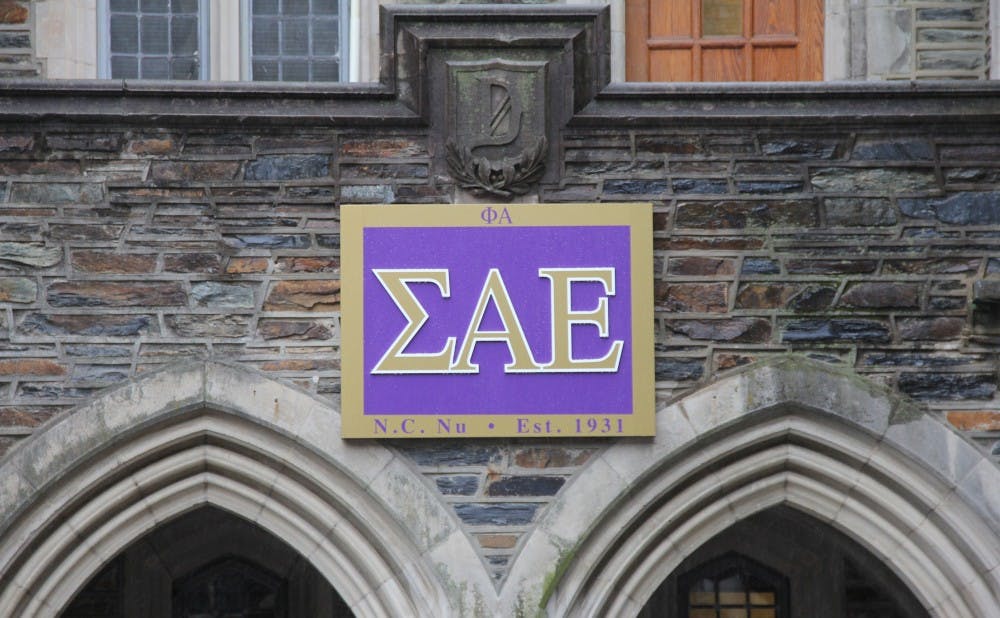The Sigma Alpha Epsilon fraternity banned pledging rituals required of recruits, reflecting a long-standing national debate about the practice.
Calling its decision “historic,” the national organization overseeing Sigma Alpha Epsilon said its ruling affects all its chapters immediately, including the one at Duke. Under its new program that SAE calls “The True Gentlemen Experience,” all new pledges who are accepted and accept bids, will immediately be “brothers.” New members will also be required to participate within 96 hours of acceptance in the Carson Starkey Membership Certification Program, a series of online alcohol safety quizzes named after a freshman who died of alcohol poisoning six years ago during an induction ritual at California Polytechnic State University in San Luis Obispo.
The Office of Fraternity and Sorority Life received a letter from SAE headquarters informing the University that “all of our chapters and colonies have been instructed to initiate their new members (pledges) as full brothers.”
Clarybel Peguero, assistant dean and director of fraternity and sorority life, declined to comment, but provided a copy of SAE’s letter to the Chronicle.
“Our new program does not have opt-in elements. Rather, all of our chapters and colonies are required to adopt these operational changes," the letter reads. "Should you hear that any of our groups are not following our policy or treating members as second-class citizens in any way, please notify us immediately.”
SAE president junior Robert Bruce and vice president junior Ethan Gottlieb deferred comment to the fraternity’s national headquarters.
Brandon Weghorst, associate executive director of communications for SAE National could not be reached for comment.
SAE’s head Bradley Cohen, who leads SAE National's Supreme Council as Eminent Supreme Archon, posted a video on Facebook to explain what he called the organization’s “radical” move.
“It’s the right thing to do…as an organization, we have been plagued with too much bad behavior, which has resulted in loss of lives, negative press and large lawsuits,” Cohen said. “[If SAE did not make this change] it may cease to exist in five years.“
SAE acknowledged on its website that some members may leave the fraternity because of the change, but it is a price the group said it is willing to pay.
“Experience also shows us that these particular members create the most risk for our organization,” SAE wrote in its roll-out message to chapters.
SAE’s March 9 decision came after years of criticism lobbed at the fraternity. Considered the deadliest fraternity by Bloomberg News' "Broken Pledges"—a series of articles examining fraternity-related deaths and injuries due to binge drinking—SAE pays the highest costs of any Greek organization due to liability insurance and has closed 15 chapters in the past three years.
Duke’s chapter of SAE was expelled from the University in 2002 for violations of risk management, including hazing and illegal alcohol use. It was reinstated in 2008, and officially received its new charter from Duke in April 2012. SAE was founded at Duke in 1931 and is one of the oldest members of the Interfraternity Council.
Since 2007, other universities have suspended or closed 40 SAE chapters. According to its website, SAE has 226 chapters, 14,000 college members and 190,000 living alumni.
Cohen, who grew up in South Africa, compared the humiliation of pledging to apartheid which formerly held sway in that nation.
”We have taken our bloodline for the fraternity—our new members—and treated them as second-class citizens," he said.
On its website, SAE said it hopes to see an eventual reduction in insurance premiums.
Vice President for Student Affairs Larry Moneta said he respected SAE's choice to ban pledging.
“I respect SAE National’s choice to make this change and hope that it proves to be successful in avoiding the kinds of incidents at other schools that prompted the change," Moneta said.
Sigma Phi Epsilon, which also has a chapter at Duke, is a 15,000 member national fraternity that banned pledging in 1991.
“Implementation of this kind of change isn’t always easy, but it is definitely worth it,” Sigma Phi Epsilon Board Member Thomas Jelke wrote in an email Saturday. “Chapter grades went up, our membership numbers increased, the quality of the men who sought us out increased and our behavioral issues decreased.”
He added that his fraternity has the highest grades among large, national fraternities. When Jelke heard that SAE banned pledging he made a donation to SAE's foundation in honor of their Supreme Council.
Get The Chronicle straight to your inbox
Signup for our weekly newsletter. Cancel at any time.

